Coronavirus: Will food supply fears see a rise in home-grown veg?
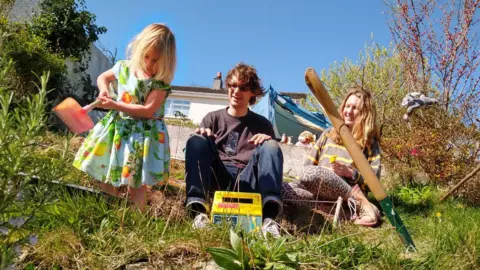 BBC
BBCEmpty supermarket shelves have unnerved much of the nation and made consumers question the security of food supplies they had taken for granted. As people ponder how they might have to source their food during the lockdown caused by the Covid-19 pandemic, will there be a growth in growing your own?
National groups including the Royal Horticultural Society and National Vegetable Society have reported a substantial increase in people starting to grow their own veg for the first time.
So what are the merits of taking things into our own glove-clad hands?
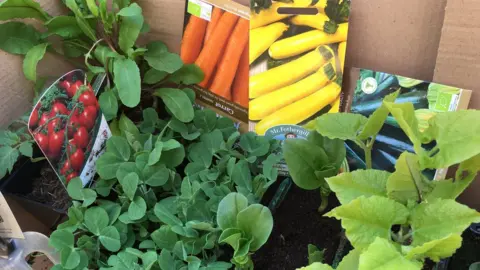
Charlie Hoskin, 38, her partner Mouse Bragg, 40 and their three-year-old daughter are one of many families who have been inspired to get digging.
"Like many our wistful intentions have been catalysed recently by the recent COVID-19 outbreak," she said.
They have been isolating for about three weeks now at their home in Cornwall.
"We have more time to channel and hopefully once the patch is established we shall enjoy salad-saving sums and a more sustainable lifestyle whilst also hatching a new family habit together," she said.
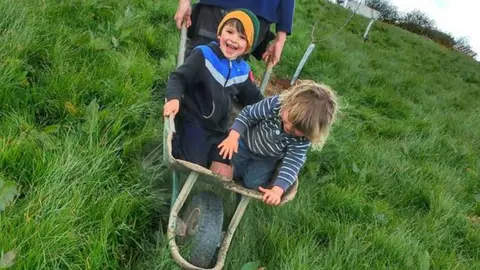 Tamasin Pemberton
Tamasin PembertonTamasin Pemberton, a green-fingered mother of three, said since the coronavirus pandemic began she had seen an influx in first-time growers at the Cornish garden centre she worked at - at least before the government closed "all but essential stores".
For years she had run her own social enterprise, Perennial Harvest, with a charity arm, trying to give families the skills to "grow their own" in workshops.
She admitted enthusiasm had been a little lacklustre - until now.
The pandemic seemed to have prompted an "overdue revival," she said, and a chance to share her passion with an audience who were really listening.
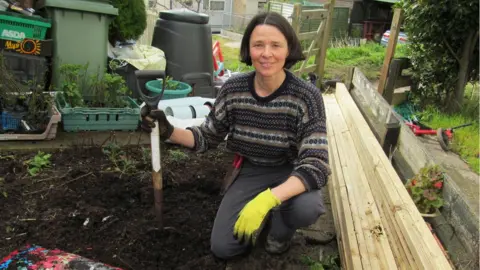 Tamasin Pemberton
Tamasin Pemberton"It's a lot of people in their 30s and 40s with young families," she said.
"People who are really keen but haven't got any experience whatsoever".
"It has touched on people's fears about food security - they've seen how bare the shelves are."
The UK government and supermarkets have said there would be more than enough food to go round, and action was being taken to meet the increased demand for deliveries to both stores and households.
But UK growers said this week they were facing a "serious labour shortage" that could risks millions of tonnes of fruit and veg failing to reach consumers.
"I don't want this to be frightening to people, I want them to think what can we practically do, and to give our kids the ability to be able to adapt, to persevere," Ms Pemberton said.
It has prompted the 43-year-old to start a Facebook blog, full of picture-guides for beginners.
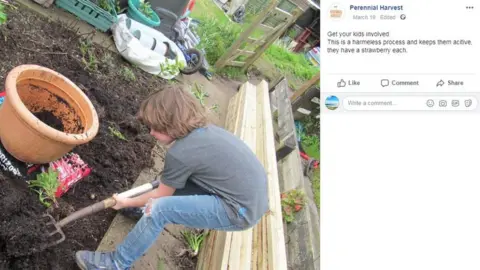 Tamasin Pemberton
Tamasin PembertonFiona Shenfield, general secretary of the National Vegetable Society, said it had seen a "big increase" in people waking up to the benefits of home growing during the current health crisis.
"In fact some of our members have been approached and have been helping by providing spare tomato plants, for example."
Leaders at the Royal Horticultural Society (RHS) also reported a boost in interest.
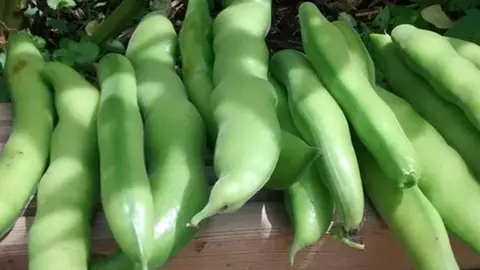
Alistair Griffiths, director of science at the the RHS, said: "There are very few, if any, other activities that can achieve all of the things that gardening can - in particular, the measurable impact on active lifestyles and mental wellbeing, such as reductions in depression, anxiety, and body mass index, as well as increases in life satisfaction and quality of life.
"Gardening is also a great way to top up your vitamin D... from direct sunlight on the skin."

- A SIMPLE GUIDE: What are the symptoms?
- MEASURES: What are countries doing?
- HOPE: Five reasons to be positive
- MAPS AND CHARTS: Visual guide to the outbreak


Growing tips from Guy Barter, the RHS's chief horticulturalist
- A sunny site is ideal, but more shade-tolerant crops include beetroot, chard, peas, runner beans, spinach and salads
- Soil is ideal but if your plot doesn't even support weeds it might be unsuitable. Growbags or containers filled with potting compost will give good crops where soil is not an option
- Clear an area of weeds by digging. Ideally add garden compost or rotted manure and fertiliser to improve the soil
- Sow seeds of whatever you like to eat. Crops that taste best freshly gathered are many peoples favourites - salads, tomatoes, new potatoes, chard and other leaf beets.
- There is no need to buy expensive seeds, bargain ones in supermarkets meet the same legal standards
- Seeds need warmth, moisture, light and air most easily provided by sowing in pots, covering very lightly with sieved compost and watering ideally from below by standing pots in a shallow dish of water
- Sowing outdoors is best for peas and beans as many plants are needed for a decent serving. Leave a finger width between small seeds, two fingers between peas and a hand's width between broad beans.
- Water heavily every 14 days if drought strikes and keep weeds down.

